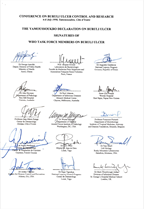The Yamoussoukro Declaration on Buruli ulcer
- We, the participants at the Conference on Buruli Ulcer Control and Research, recognize that Buruli ulcer (also called Bairnsdale ulcer in Australia), the third most common mycobacterial disease after tuberculosis and leprosy, is a foremost cause of human suffering. In West Africa, in particular, the disease is rapidly emerging as a serious public health problem.
- Buruli ulcer affects, primarily, poor communities, and especially children and women with limited access to health care. We are concerned that with the increasing number of cases and the associated health complications, Buruli ulcer could hinder efforts to improve the economic and social development of the communities most affected.
- We are deeply concerned that very little is known about this disease. We believe that multidisciplinary research, including vaccine and drug development, could result in minimal noninvasive treatment of the disease. We recognize that early detection and early surgical treatment before ulceration are curative and avoid the complications currently associated with the disease.
- We further recognize that, because the people most affected have limited access to health care and usually seek help at an advanced stage of the disease, when complications are devastating, hospitalization is often prolonged and hence costly to the health services, the patients and their families.
- We, the participants at the Conference on Buruli Ulcer Control and Research, and more especially, Heads of State and government representatives from the most affected countries, are committed to mobilize the resources needed to establish, as soon as possible, effective action to control Buruli ulcer as an integral part of primary health care.
- We pledge to make all efforts:
- to provide simple surgical facilities at the peripheral level for the treatment of nodular and early ulcerative disease;
- to improve and sustain health education on Buruli ulcer at all levels;
- to establish as soon as possible surveillance systems and to conduct surveys to determine the burden of the disease, provided that treatment can be offered to all patients identified;
- to collaborate in research on transmission and prevention of the disease;
- to monitor the implementation of the above measures.
- We stress that these efforts be supported by the international community as a whole. We therefore, call on governments, organizations of the United Nations system, bilateral agencies, development banks, non-governmental organizations, foundations, and research institutions:
- to cooperate directly with endemic countries to undertake the activities needed;
- to develop partnerships and cooperation with organizations and programs involved in health system development, so that effective treatment can reach all those affected.
- We, therefore, affirm our support for the WHO Global Buruli Ulcer Initiative, which will address problems associated with Buruli ulcer and strengthen general health care delivery, thus contributing to building up capacity in endemic countries.
- We affirm our determination to intensify action against Buruli ulcer. Recognizing the link between Buruli ulcer and overall development, we adopt this Declaration and commit ourselves to its implementation.

9 July 1998
The Yamoussoukro Declaration on Buruli ulcer
The Yamoussoukro Declaration on Buruli Ulcer was signed during the conference on Buruli ulcer control and research held in Yamoussokro, Côte d'Ivoire (6-8...
